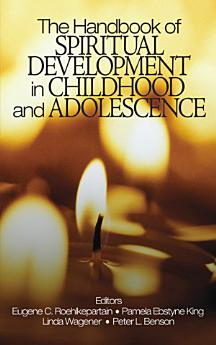The Handbook of Spiritual Development in Childhood and Adolescence
About this ebook
—JOURNAL OF YOUTH AND THEOLOGY
"Research into spiritual development during childhood and adolescence has . . . yearned for the stimulus of integration, cross-fertilization, and internationalization, across conceptual boundaries, methodological divisions, religious traditions, and local interests. The Handbook of Spiritual Development in Childhood and Adolescence sets out to meet this need and does so with skill and with authority, by identifying the key themes and by drawing on the best minds to address those themes. Research communities and faith communities have been well served by this pioneering initiative."
- The Revd Professor Leslie J Francis PhD, ScD, DD, University of Wales, Bangor, UK
The Handbook of Spiritual Development in Childhood and Adolescence breaks new ground by articulating the state of knowledge in the area of childhood and adolescent spiritual development. Featuring a rich array of theory and research from an international assortment of leading social scientists in multiple disciplines, this book represents work from diverse traditions and approaches – making it an invaluable resource for scholars across a variety of disciplines and organizations.
Key Features:
- Presents a wealth of interdisciplinary theory and research, as well as proposals for future areas of inquiry, to help move spiritual development into a mainstream field of learning
- Provides the first comprehensive collection of social science research on spiritual development in childhood and adolescence to introduce the topic engagingly to students
- Features the works of scholars from around the world in multiple disciplines (psychology, sociology, anthropology, medicine, and educational philosophy) to present a diversity of traditions and approaches
- Includes introductions to the volume as well as to each section that provide overviews and syntheses of key concepts
The Handbook of Spiritual Development in Childhood and Adolescence is a key resource for academics, researchers, and students in departments of Psychology, Family Studies, and Religious Studies. It is particularly useful for courses in Developmental Psychology, Human Development (especially child and adolescent development), Psychology of Religion, and Sociology of Religion. It also will be invaluable for professionals working with young people, including educators, religious leaders, and health practitioners.
About the author
Pamela Ebstyne King serves as research assistant professor of psychology in the Center for Research in Child and Adolescent Development in the School of Psychology at Fuller Theological Seminary in Pasadena, California. Her primary research and teaching interests include positive youth development, spiritual and moral development, and theological perspectives of development. She is particularly interested in enabling thriving through families, congregations, schools, and youth-serving organizations. Ordained in the Presbyterian Church (USA), Dr. King has a background in child, youth, and adult ministry; a master’s of divinity; and Ph.D. in family studies from Fuller Theological Seminary. She was a visiting scholar under the Divinity Faculty at Cambridge University and did her postdoctoral work at the Stanford Center on Adolescence. Dr. King is a coauthor of The Reciprocating Self: Human Development in Theological Perspective (2005). Her research has been published in Developmental Psychology, Applied Developmental Science, the Journal of Early Adolescence, and the Journal of Psychology and Christianity.
Linda M. Wagener is associate professor of psychology and associate dean of the graduate school of psychology at Fuller Theological Seminary, where she is also codirector of the Center for Research in Child and Adolescent Development. Her research interests include positive youth development, with a particular focus on the spiritual, religious, and moral development of adolescence. Dr. Wagener is currently a principal investigator on an adolescent violence prevention grant from the United States Office of Juvenile Justice and Delinquency Prevention.
Peter L. Benson is president of Search Institute, which provides leadership, knowledge, and resources to promote healthy children, youth, and communities. He has written extensively in adolescent development, altruism, spiritual development, and thriving in adolescence. He serves as principal investigator for Search Institute’s initiative on spiritual development in childhood and adolescence. In 1991, he received the William James Award for career contributions to the psychology of religion from the American Psychological Association. Dr. Benson is the author or editor of numerous books and articles, including Developmental Assets and Asset-Building Communities, All Kids Are Our Kids: What Communities Must Do to Raise Caring and Responsible Children and Adolescents, and Religion on Capitol Hill: Myths and Realities. He is general editor for the Search Institute Series on Developmentally Attentive Community and Society, published by Springer. He holds a doctorate in experimental social psychology from the University of Denver.






